-
New Directors/New Films and Film Comment Selects 2015
 Selects
Selects
FEBRUARY 29-Narch 5, 2015 2014 PUBLIC SCREENINGS
Full FSLC program here.
GENERAL FILM FORUM discussion and announcement thread HERE.

MARCH 18-29 2015 PUBLIC SCREENINGS
As before I will attend screenings of all the New Directors/New Films series and a few of the more elusive Film Comment Selects. A link index of the reviews is below. All but Theeb were shown in the press screenings and are covered in this thread.
Links to the reviews:
Christmas, Again (Charles Poekel 2014)
Screening with Going Out (Ted Fendt 2014, 8 mins.)
Court (Chaitanya Tamhane 2014)
The Creation of Meaning/La creazione di significato (Simone Rapisarda Casanova 2014)
Diary of a Teenage Girl, The (Marielle Heller 2014)
Dog Lady (Laura Citarella, Verónica Llinás 2015)
Entertainment (Rick Alverson 2015)
Fool, The/Durak (Yuriy Bykov 2014)
Fort Buchanan (Benjamin Crotty 2014)
Screening with Taprobana (Gabriel Abrantes 2014, 24 mins.)
Goodnight Mommy (Severin Fiala, Veronika Franz 2014)
The Great Man (Sarah Leonor 2014)
Haemoo (Shim Sung-bo 2014)
High Society/Le beau monde (Julie Lopes-Curval 2014)--FCS
Los Hongos (Oscar Ruiz Navia 2014)
K (Darhad Erdenibulag & Emyr ap Richard 2015)
The Kindergarten Teacher (Nadav Lapid 2014)
Screening with: Why? (Nadav Lapid 2015, 5 mins.)
Line of Credit (Salomé Alexi 2014)
Listen to Me Marlon (Stevan Riley 214)
Mercuriales (Virgil Vernierj 2014)
Ow (Yohei Suzuki 2014)
Parabellum (Lukas Valenta Rinner 2015)
Screening with Colours (2 mins.) (Evan Johnson 2014)
Phoenix (Christian Petzold 2014)--FCS
SHORTS Program 1
SHORTS Program 2
Theeb (Naji Abu Nowar (2014)
Tired Moonlight (Britni WesT 2014)
The Tribe (Miroslav Slaboshpitsky (2014)
Tu dors Nicole (Stéphane Lafleur 2014)
Violet (Bas Devos 2014)
Western (Bill, Turner Ross 2015)
White God (Kornél Mundruczó 2014)
SURVEYING THE SERIES.
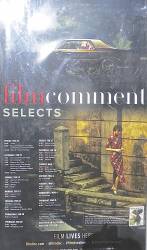
Last edited by Chris Knipp; 01-20-2016 at 12:05 PM.
-

March 18-29, 2015
Dedicated to the discovery and support of emerging artists, New Directors/New Films has earned an international reputation as the premier festival for works that break or re-cast the cinematic mold. Celebrating its 44th year in 2015, the festival takes place March 18-29 and is presented jointly by the Film Society of Lincoln Center and The Museum of Modern Art.
Tickets go on sale to FSLC and MoMA members on March 3. Tickets go on sale to the general public on March 10.
Early selections.

Christmas, Again | Charles Poekel
USA | 2014 | 79 min.
Writer-director Charles Poekel has transformed three years of “fieldwork” peddling Christmas trees on the streets of New York into a sharply observed and wistfully comic portrait of urban loneliness and companionship, shot on 16mm by acclaimed cinematographer Sean Price Williams (Listen Up Philip, Heaven Knows What).

Court | Chaitanya Tamhane
India | 2014 | 116 min.
Marathi, Gujarati, and Hindi with English subtitles
Chaitanya Tamhane’s absurdist portrait of injustice, caste prejudice, and venal politics in contemporary India won top prizes at the Venice and Mumbai Film Festivals and features a brilliant ensemble cast of professional and nonprofessional actors who capture the rich complexity and contradictions of Indian society.
The Creation of Meaning / La creazione di significato | Simone Rapisarda Casanova
Canada/Italy | 2014 | 95 min.
Though its title arcs toward grand philosophical inquiry, the stirring power of Simone Rapisarda Casanova’s documentary-fiction hybrid—winner of the Best Emerging Director prize at Locarno—lies in its intimacy of detail and wry political observation, filmed with a painterly Renaissance beauty in Tuscany’s remote Apennine mountains.

Entertainment | Rick Alverson
USA | 2015 | 110 min.
The Comedy director Rick Alverson teams with comedians Gregg Turkington (better known as Neil Hamburger) and Tim Heidecker for a hallucinatory journey to the end of the night. A washed-up comic on tour with a teenage mime works his way across the Mojave Desert on a one-of-a-kind odyssey that is by turns mortifying and beautiful, bewildering and absorbing.

Goodnight Mommy | Severin Fiala & Veronika Franz
Austria | 2014 | 100 min.
German with English subtitles
The dread of parental abandonment is trumped by the terror of menacing spawn in Severin Fiala and Veronika Franz’s exquisite, cerebral horror-thriller. Produced by Ulrich Seidl, Goodnight Mommy is a heartbreaking tale of love and loss wrapped in one of the scariest films of the year.

The Great Man | Sarah Leonor
France | 2014 | 107 min.
French with English subtitles
The intrinsic struggle between paternal/fraternal responsibility and unfettered mobility takes on a deeply moving dimension in Sarah Leonor’s by turns heartbreaking and empowering sophomore feature, which follows two French Legionnaires at the end of their posting in Afghanistan.

The Kindergarten Teacher | Nadav Lapid
Israel/France | 2014 | 119 min.
Hebrew with English subtitles
Nadav Lapid’s follow-up to his explosive debut, Policeman, is a brilliant, shape-shifting provocation in which a fortysomething teacher in Tel Aviv becomes obsessed with one of her charges, a 5-year-old poetry prodigy, yielding a perversely romantic work whose underlying conviction seems to be that in an ugly world, beauty still has the power to drive us mad.
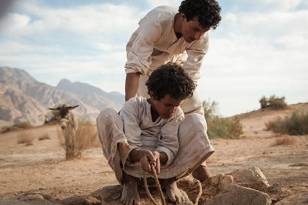
Theeb | Naji Abu Nowar
Jordan/Qatar/United Arab Emirates/UK | 2014 | 100 min.
Arabic with English subtitles
Classic storytelling at its finest, this quietly gripping adventure tale, set in 1916 in a desert province on the edge of the Ottoman Empire, follows the younger brother of a Bedouin guide, tasked with helping a British Army Officer and his translator, as he learns to survive and becomes a man amidst the violent and mysterious agendas of adults.

The Tribe | Myroslav Slaboshpytskiy
Ukraine | 2014 | 132 min.
Set it in a spartan boarding school for deaf and mute coeds and told entirely through un-subtitled sign language, Myroslav Slaboshpytskiy’s Cannes Critics’ Week Grand Prize–winning feature debut overcomes what may sound like impossible obstacles to tell a grim but uncannily immersive story of exploitation and brutality in a dog-eat-dog world, delivering a high-school movie you won’t forget.

White God | Kornél Mundruczó
Hungary | 2014 | 119 min.
Hungarian with English subtitles
Kornél Mundruczó’s shocking fable, which won the Un Certain Regard prize in Cannes, captivatingly weaves together elements of melodrama, adventure, and a bit of horror in order to pose fundamental questions of equality, class, and humanity, as an outcast mutt and an army of fellow canines set out to take their revenge on the humans who have wronged them.
Last edited by Chris Knipp; 03-17-2015 at 02:11 PM.
-
New Directors/New Films: FULL SLATE 2015

ND/NF 2015 full series:
The Diary of a Teenage Girl | Marielle Heller
USA | 2014 | 100 min.
Winner of a Special Jury Prize for Excellence in Cinematography at Sundance, this adaptation of Phoebe Gloeckner’s graphic novel, set in 1970s San Francisco, features stunning newcomer Bel Powley as a 15-year-old girl whose sexual awakening involves having an affair with her mother’s boyfriend (Alexander Skarsgård). Opening Night!
Entertainment | Rick Alverson
USA | 2015 | 110 min.
The Comedy director Rick Alverson teams with comedians Gregg Turkington (better known as Neil Hamburger) and Tim Heidecker for a hallucinatory journey to the end of the night. A washed-up comic on tour with a teenage mime works his way across the Mojave Desert on a one-of-a-kind odyssey that is by turns mortifying and beautiful, bewildering and absorbing. Closing Night!
Christmas, Again | Charles Poekel
USA | 2014 | 79 min.
Writer-director Charles Poekel has transformed three years of “fieldwork” peddling Christmas trees on the streets of New York into a sharply observed and wistfully comic portrait of urban loneliness and companionship, shot on 16mm by acclaimed cinematographer Sean Price Williams (Listen Up Philip, Heaven Knows What).
Screening with:
Going Out | Ted Fendt
USA | 2014 | 8 min.
Liz thinks she’s going on a date with Rob to see RoboCop, but things take an unexpected (and inexplicable) turn.
CourtCourt | Chaitanya Tamhane
India | 2014 | 116 min.
Chaitanya Tamhane’s absurdist portrait of injustice, caste prejudice, and venal politics in contemporary India won top prizes at the Venice and Mumbai Film Festivals and features a brilliant ensemble cast of professional and nonprofessional actors who capture the rich complexity and contradictions of Indian society.
The Creation of Meaning / La creazione di significato | Simone Rapisarda Casanova
Canada/Italy | 2014 | 95 min.
Though its title arcs toward grand philosophical inquiry, the stirring power of Simone Rapisarda Casanova’s documentary-fiction hybrid--winner of the Best Emerging Director prize at Locarno—-lies in its intimacy of detail and wry political observation, filmed with a painterly Renaissance beauty in Tuscany’s remote Apennine mountains.
Dog Lady
Dog Lady | Laura Citarella & Verónica Llinás
Argentina | 2015 | 95 min.
This indelible and quietly haunting study of an enigmatic, nameless woman living with a loyal pack of stray dogs in silent, self-imposed exile on the edge of Buenos Aires follows her across four seasons with an attentive and sympathetic eye, culminating in an unforgettable extended final shot.
The Fool | Yuriy Bykov
Russia | 2014 | 116 min.
An engineering student discovers two massive cracks in a decaying provincial housing project but is stymied in his attempts to avert a catastrophe in this stinging rebuke to the endemic corruption of the Russian body politic, which earned writer-director-actor Yuriy Bykov four awards at the 2014 Locarno Film Festival.
Fort Buchanan | Benjamin Crotty
France/Tunisia | 2014 | 65 min.
Shot in richly textured 16mm, Benjamin Crotty’s queer soap opera chronicles the tragicomic plight of frail, lonely Roger, who seeks comfort and companionship from the sexually frustrated army wives of a remote military post in the woods while his husband carries out a mission in Djibouti.
Screening with:
Taprobana | Gabriel Abrantes
Portugal/Sri Lanka/Denmark/France | 2014 | 24 min.
A sensuous and debauched portrait of Portugal’s national poet Luís Vaz de Camões teetering on the borderline between Paradise and Hell.
Goodnight Mommy | Severin Fiala & Veronika Franz
Austria | 2014 | 100 min.
The dread of parental abandonment is trumped by the terror of menacing spawn in Severin Fiala and Veronika Franz’s exquisite, cerebral horror-thriller. Produced by Ulrich Seidl, Goodnight Mommy is a heartbreaking tale of love and loss wrapped in one of the scariest films of the year.
The Great Man | Sarah Leonor
France | 2014 | 107 min.
The intrinsic struggle between paternal/fraternal responsibility and unfettered mobility takes on a deeply moving dimension in Sarah Leonor’s by turns heartbreaking and empowering sophomore feature, which follows two French Legionnaires at the end of their posting in Afghanistan.
Haemoo | Shim Sung-bo
South Korea | 2014 | 111 min.
First-time director Shim Sung-bo distills a gripping drama from a real-life incident and delivers a gritty, brooding spectacle of life and death on the high seas. This tense, hair-raising nautical thriller was produced by Bong Joon-ho—whose second feature, Memories of Murder, was written by Shim.
Los HongosLos Hongos | Oscar Ruiz Navia
Colombia/Argentina/France/Germany | 2014 | 103 min.
Full of vibrant color and great music, Los Hongos is a charming and surprising coming-of-age film that follows Cali street artists Ras and Calvin, good friends from disparate class backgrounds who band together with other artists to paint a tribute to the student protestors of the Arab Spring.
K | Darhad Erdenibulag & Emyr ap Richard
China | 2015 | 88 min.
At once familiar and strange, this reimagining of Kafka’s The Castle is utterly specific to its striking Inner Mongolia setting, and totally faithful to is origins in portraying faceless bureaucracy as a timeless and universal frustration. Produced by Jia Zhang-ke, K is the rare literary adaptation that honors the source material even while reinventing it.
The Kindergarten Teacher | Nadav Lapid
Israel/France | 2014 | 119 min.
Nadav Lapid’s follow-up to his explosive debut, Policeman, is a brilliant, shape-shifting provocation in which a fortysomething teacher in Tel Aviv becomes obsessed with one of her charges, a 5-year-old poetry prodigy, yielding a perversely romantic work whose underlying conviction seems to be that in an ugly world, beauty still has the power to drive us mad.
Screening with:
Why? | Nadav Lapid
Israel | 2015 | 5 min.
A filmmaker is asked by Cahiers du Cinéma to choose the image that made him believe in cinema.
Line of Credit | Salomé Alexi
France/Georgia | 2014 | 85 min.
Nino is a forty-something woman with a small shop in Tbilisi who grew up without thinking about the complexities of finance. But when the money gets tight, Nino goes about taking loan after loan, but even as the situation grows reckless, Salomé Alexi maintains a beautifully light, comedic tone in her feature-film debut.
Listen to Me Marlon | Stevan Riley
UK | 2015 | 100 min.
Documentarian Stevan Riley explores the on- and off-screen lives of Marlon Brando, using a vast trove of audio recordings made by the actor himself to allow Brando to tell his own story, filled with bones to pick, strong opinions, and fascinating traces of one of the most alluring figures in the history of cinema.
Mercuriales | Virgil Vernier
France | 2014 | 100 min.
This freely inventive breakthrough work from ambitious young French director Virgil Vernier is a radical experiment in form that also lavishes tender attention on its characters. As two young receptionists in the titular Paris high-rise drift from one situation to the next, Vernier’s visual style grows ever more surprising and beautiful.
OwOw | Yohei Suzuki
Japan | 2014 | 89 min.
Jobless young Tetsuo and his girlfriend Yuriko are inexplicably immobilized after laying eyes on an orb-like object that appears out of nowhere, setting into motion an enigmatic chain of events and an obsessive investigation by journalist Deguchi in this deadpan mystery that just might be a comment on the social malaise and inertia of 21st-century Japan.
Parabellum | Lukas Valenta Rinner
Argentina/Austria/Uruguay | 2015 | 75 min.
In the midst of riots and social unrest, a Buenos Aires office worker puts his life on hold and departs for a vacation with a difference—think hand-to-hand combat and homemade explosives training in place of yoga and nature walks—in Austrian filmmaker Lukas Valenta Rinner’s carefully composed, minimalist end-of-days tale.
Screening with:
Colours | Evan Johnson
Canada | 2014 | 2 min.
A compact, chromatic visual essay on our way of seeing by Guy Maddin collaborator Evan Johnson.
Theeb
Theeb | Naji Abu Nowar
Jordan/Qatar/United Arab Emirates/UK | 2014 | 100 min.
Classic storytelling at its finest, this quietly gripping adventure tale, set in 1916 in a desert province on the edge of the Ottoman Empire, follows the younger brother of a Bedouin guide, tasked with helping a British Army Officer and his translator, as he learns to survive and becomes a man amidst the violent and mysterious agendas of adults.
Tired Moonlight
Tired Moonlight | Britni West
USA | 2014 | 76 min.
Britni West’s Slamdance-winning directorial debut, photographed on Super-16mm and featuring a mostly nonprofessional cast in semi-fictionalized roles, discovers homespun poetry among the good folk of her native Kalispell, Montana, yielding a sui generis slice of contemporary naturalism.
The Tribe
The Tribe | Myroslav Slaboshpytskiy
Ukraine | 2014 | 132 min.
Set it in a spartan boarding school for deaf and mute coeds and told entirely through un-subtitled sign language, Myroslav Slaboshpytskiy’s Cannes Critics’ Week Grand Prize–winning feature debut overcomes what may sound like impossible obstacles to tell a grim but uncannily immersive story of exploitation and brutality in a dog-eat-dog world, delivering a high-school movie you won’t forget.
Tu dors Nicole
Tu dors Nicole | Stéphane Lafleur
Canada | 2014 | 93 min.
This disarmingly atmospheric comedy, following the summer (mis)adventures of a band of utterly unique characters and shot in lush black-and-white 35mm, is Québécois director Stéphane Lafleur’s ode to the wry tradition of Aki Kaurismäki, Fernando Eimbcke, and Jim Jarmusch.
VioletViolet | Bas Devos
Belgium/Netherlands | 2014 | 82 min.
Writer/director Bas Devos’s feature debut is a muted but harrowing portrayal of aimless, maladjusted youth. With an uneasy yet entrancing atmosphere, Violet is a continually surprising exploration of pain and guilt, an interior voyage that only grows tenser and more affecting as it arrives at darker, less comprehensible regions of the soul.
Western
Western | Bill & Turner Ross
USA | 2015 | 93 min.
Drug cartel violence and border politics threaten the neighborly rapport between Eagle Pass, Texas, and Piedras Negras, Mexico in Bill and Turner Ross’s trenchant and passionately observed documentary, which firmly positions the brothers at the frontier of a new, compelling kind of American vernacular cinema.
White God
White God | Kornél Mundruczó
Hungary | 2014 | 119 min.
Kornél Mundruczó’s shocking fable, which won the Un Certain Regard prize in Cannes, captivatingly weaves together elements of melodrama, adventure, and a bit of horror in order to pose fundamental questions of equality, class, and humanity, as an outcast mutt and an army of fellow canines set out to take their revenge on the humans who have wronged them.
Last edited by Chris Knipp; 03-06-2015 at 07:40 AM.
-
Marielle Heller: DIARY OF A TEENAGE GIRL (2015)
Opening Night
MARIELLE HELLER: DIARY OF A TEENAGE GIRL (2015)
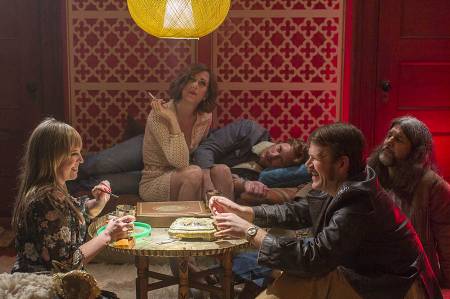
WIIG, SARSGARD, ET AL. IN DIARY
Growing up bold and hedonistic in Seventies San Francisco
In The Diary of a Teenage Girl, first-time director Marielle Heller succeeds admirably in adapting Phoebe Gloeckner’s semi-autobiographical graphic novel—about sexual and drug experimentation in 1970s San Francisco. This is due primarily to the discovery of young English actress innie Bel Powley, whose precocious 15-year-old character Minnie Goetze, Gloeckner's alter ego, is in every scene and voice-over narrates in a facsimile of Minnie's cassette-taped diaries. "Oh my God, I had sex today!" she breathlessly declares at the very outset. And she's had sex, for the first time but by no means the last, with her mother (Kirsten Wiig's) boyfriend Monroe (Alexander Skarsgård), a handsome, slightly goofy, beer-quaffing almost-hippie. For a while, this titillating and ostensibly shocking material is wholly absorbing and almost delightful. It may go on a few minutes too long, but Heller & Co. have got it right.
Without being sticklers for accuracy, the filmmakers have used their faded sepia cinematography and authentic locations to recreate the mood and look of 1975 San Francisco beautifully. This is still going on, and works pretty well for those of us who were there, all the way to the end of the film when its lack of a strong story line has caused interest in Minnie to fade. For young women looking for experiences to identify with, there may be no fading. Kirsten Wiig keeps her edge as the hard-partying mom, though the role isn't one quite worthy of a comic of Wiig's caliber. For those young women, Skarsgård's generic attractiveness and almost perfect replication of an ineffectual young American male may stay interesting, even if it's clearly no more than skin-deep.
The important aspect of the film, for sophisticated and broad minded audiences, is that it manages to show a 35-year-old adult male deflowering (at her instigation) and repeatedly bedding an underage girl, without seeming shocking or in bad taste. It's a situation that fits in perfectly with semi-boho 1975 San Francisco while it might feel decadent or repellant shown in another milieu. Gloeckner was putatively depicting the environment where she actually grew up. This is an era of hedonism: Minnie is unabashedly hedonistic. And as Bilge Ebiri wrote at Sundance for The Vulture, "the earthiness that Heller and Powley bring to Minnie’s experimentation with sex, drugs, and independence is refreshingly amoral, funny, and poignant."
The Diary of a Teenage Girl is one of those cute-bold-offbeat indie films Sundance dreams of, one that convinces, that has a point of view, and flows. Ideally, it will appeal to an audience beyond young women or nostalgia seekers. Another element that makes it worth watching is the most specifically autobiographical one. Minnie (so brightly and compellingly embodied by Bel Powley) is wide eyed and naive but also boldly experimental and gloriously enthusiastic about sex (some little animations, adding to the post-Flower Child era feel, embellish this). But she's also a budding Crumb-style cartoonist and graphic artist, filling sketchbooks with drawings and comic page layouts on a daily basis. As with so many coming of age stories about a young artist, the main event is that becoming -- going out into the world with her drawings. This too the film effectively portrays, thus giving the film a little wider context.
The Diary of a Teenage Girl, 100 mins., debuted at Sundance 2015. Now a Sony Pictures Classics release. Screened for this review as part of New Directors/New Films, a series of the Film Society of Lincoln Center and MoMA.
Last edited by Chris Knipp; 07-16-2015 at 08:55 AM.
-
Bas Devos: VIOLET (2014)
BAS DEVOS: VIOLET (2014)
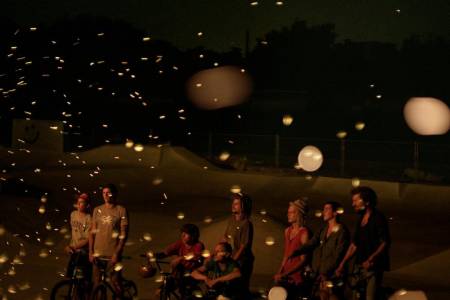
Still from Violet
Belgian bike boy suffering vivid loss
In Bas Devos' mute, artful feature, Jesse (Cesar De Sutter) is a blond Belgian teenager who is forced to watch his pal Jonas knifed to death in a mall (an event the viewer also sees helplessly, playing off on CCTV surveillance monitors); and he spends the rest of the film trying to process this loss. A lot of things happen (and it has a vérité feel that can't be entirely faked). Not much is said. The sometimes avant-garde-feeling cinematography speaks volumes, to our aesthetic sense, at least.
Clearly, the material in Devos' Violet closely matches Gus Van Sant's Paranoid Park, though Jesse is less overtly guilty, just appeals complicit to his friends, who don't understand why he was there but couldn't stop Jonas from getting killed, or why Jonas got killed and he didn't. The slim, inarticulate boys are much the same, with BMX bikes and a forested bike playground reached by car replacing the questionable "Paranoid Park" of Van Sant's skateboarders. I am obliged to Boyd van Hoeij, reviewing Violet at the Berlinale for Hollywood Reporter, for the reminder that Paranoid Park was shot by Wong Kar Wai's eccentric and brilliant cinematographer Christopher Doyle. This film turns out to have been done, in 65mm. and with the digital Alexa by Nicolas Karakatsanis, perhaps an equal ace behind the camera and who has recently also been the dp for not only Bullhead, the extraordinarily talented Matthias Schoenaerts' breakthrough film directed by Michaël R. Roskam, but for Roskam's The Drop (with Schoenaerts as well as Gandolfini) and The Loft, another Belgian-directed film with Schoenaerts and American actors. But all these are guaranteed to be more accessible than the mute and withholding Violet, which challenges its viewers to stay tuned and put things together into a coherent tale. Van Sant did however do much the same thing in Paranoid Park, if more accessibly.
One could go on at length about the special beauties of Karakatsanis' images. As van Hoeij puts it, the 65mm images, which provide a wealth of shallow focus in closeup portraits -- lingering long on De Sutter's head from above, for instance, right after the crime, as he stares down for a long silent stretch waiting for his mother to comfort him and clean the blood off him -- everything but the long blond swath of hair a beautiful blur. Images contrasty like this seem to sing but also, more to the point here, can seem to shriek at us. Or there is Jesse's family's house seen from a distance in the twilight, with colors quietly intense and everything in the rooms clearly visible, though small. Meanwhile the academy ratio images feel intimate but confined, like the uptight sensibility of the inarticulate boys, who seem to re-bond with Jesse only by riding bikes beside and around him; and the confinement of his (again inarticulate) grief. It's not clear every viewer will grasp any of this; for anybody it may take some effort, and for those out of tune it will seem just willful artiness. But we'd like to see more collaborations between Devos and Karakatsanis. Their use of actors and milueux as well as images is pro.
But this film risks seeming little more than an arty remake. Mike D'Angelo saw it as part of ND/NF too, and has tweeted: "Gave up on a moody ND/NF film, shot in 1.33, about a teen dirt biker who witnesses a death. Aren’t filmmakers aware of other major films?" and "What I saw was almost exactly PARANOID PARK, except with fewer dialogue scenes and even more shots of kids flying through the air."
Violet, 82 mins., debuted at the Berlinale February 2014; over a dozen other festival showings since then, including Edinburgh, Karlovy, Sarajevo and Toronto. Screened for this review as part of the Film Society of Lincoln Center-Museum of Modern Art series, New Directors/New Films of March 2015.
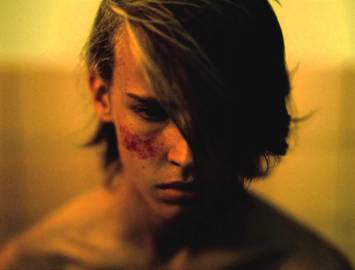
Cesar De Sutter in Violet
Last edited by Chris Knipp; 03-17-2015 at 06:45 PM.
-
Britni West: TIRED MOONLIGHT (2014)
BRITNI WEST: TIRED MOONLIGHT (2014)
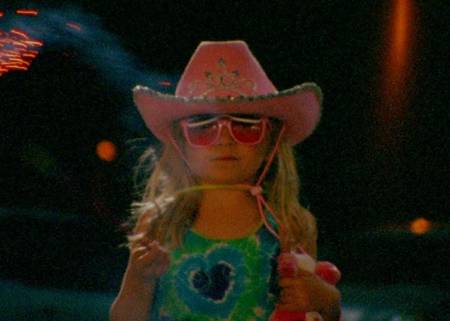
Tired viewer
The New Directors blurb about Britni West's directorial debut says it "discovers homespun poetry about the good folk of West's native Kalispell, Montana. . . a small town populated by lonely hearts engaging in awkward one-night stands, children with starry eyes and bruised knees, stock-car drivers, junkyard treasure hunters, and bighorn sheep." "Rarely," the blurbist enthuses, "has Big Sky Country ever cast such a sweetly comic and tender spell." The spell eluded me in this sloppy docudrama, which reads more like a poorly edited collection of random footage than a film. West edits as if he had ADD, jumping from one subject to another randomly over and over with no buildup of meaning, though indeed, the kids, drivers, junk hunters, clumsy youthful suitors and oddball couples keep recurring.
"Photographed in Super-16mm by Adam Ginsberg," the blurb points out, "(who shot Alex Karpovsky's Red Flag (SFJFF 2013)and featuring a mostly nonprofessional cast (with the exception of indie favorite Alex Karpovsky) in semi-fictionalized roles, Tired Moonlight is a sui generis sliceof contemporary naturalism." That is a nice way of putting it.
This film makes most sense when regarded not as a movie but as someone collecting still images (without yet editing them) using a motion picture camera. There is something of Robert Frank's frumpy but iconic photo classic The Americans here. Something of Stephen Shore's semi-urban, not-quite-random American cross-country, crossroads landscapes. Something of Lee Friedlander. Since this is color, often bright color, there is or may need to be something of William Eggleston. But whether Adam Ginsberg and Britni West are aware of these borrowings or they are unconscious is uncertain. More likely the latter, since aesthetically this film is as ugly as any documentary could be that had the justification this lacks of solid content. In any case, West and Ginsberg have not found a mood or a focus. They have not found a story to tell. Or, to put it differently, they have found too many stories to tell, and needed to narrow them down. This is rural Americana. But what does that mean now? How is it different from the heyday of Frank, Friedlander, or Eggleston? West and Ginsberg need to transcend the traditions in their own fresh way. Here they have given us material for a film, but not a film. Winding up with the Fourth of July and a lot of fireworks does not make a conclusion.
Tired Moonlight, 76 mins., debuted simultaneously at Slamdance and Rotterdam. Screened for this review as part of the March 2015 FSLC-MoMA series New Directors/New Films.
Last edited by Chris Knipp; 03-03-2015 at 09:03 AM.
-
Simone Rapisarda Casanova: THE CREATION OF MEANING (2014)
SIMONE RAPISARDA CASANOVA: THE CREATION OF MEANING/LA CREAZIONE DI SIGNIFICATO (2014)
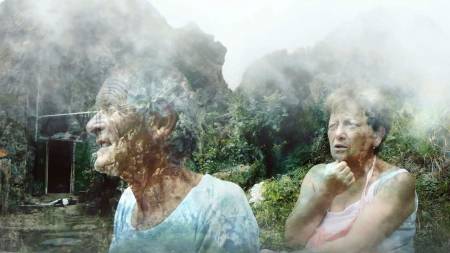
Italy past and present viewed from the mountains
Despite its pretentious-sounding title,* Casanova's hybrid documentary, his second, is a down to earth portrait of a segment of the Apennine mountains of Tuscany. And unlike Micheelangelo Frammartino's Le quattro volte, with which it's been compared and to which it bears a passing resemblance, this doesn't take much figuring out. It's about a place and its relation to modern history as seen glancingly through an individual.
There are various discussions of what this region was like during the War, when Germans were around and also partisans to fight them: it was a theater of conflict, divided by the Gothic Line, as a group of school-kids discuss. And there is a view of one man's life, sixty-something Pacifico Pieruccioni. He's tall and thin and healthy-looking, sort of late Henry Fonda. He maintains a limited farm but has run out of money, so it's going to be sold. He asks one guy to buy it so it doesn't fall into the hands of a scoundrel ("mascalzone"is one word he uses). But it's a friendly German, with a little blond boy named Benjamin, an Italian speaker living in Pisa, who is the buyer.
Along the way there are various chats, Pacifico doing chores in summer shorts, and a crowded table of outdoor diners who sing a rousing song with the full-throated, melodious voices only Italians have.
A more extended conversation that concludes the film deals with the pros and cons of German vs. Italian life. conversation between this gent and Pacifico concludes the film. The German can't understand how the Italians can have consented to be badly governed for twenty years. But he sees the bad government itself as a source of freedom, the lack of tight rules that for him is the appeal of the country compared to is well-run native land. The ugly side of contemporary Italy comes through when Pacifico flips on his radio upon rising and gets a talk show full of nasty political invective that makes Fox News commentaries sound mild.
Neil Young of Hollywood Reporter reviewed this film from Locarno.A follow-up to 2011's first film set in Cuba, The Strawberry Tree. The Sicilian-born filmmaker is based in Montreal.
The Creation of Meaning/La creazione di significato, 95 mins., a Canada-Italy production, debuted at Locarno 2014 (Best Emerging Director prize there), also showing at Vienna and Rotterdam. It was screened for this review as part of the March 2015 FSLC-MoMA series New Directors/New Films.
_____________
*Casanova explains it: "To make sense of the world that surrounds us we tell stories, even if we know that they are ephemeral as our lives. My film tells a simple story where the viewer is invited to seek out the narrative threads running between past and present and in thus doing so partake in an ephemeral creation of meaning."
Last edited by Chris Knipp; 03-17-2015 at 06:04 PM.
-
Yury Bykov: THE FOOL (2014)
YURY BYKOV: THE FOOL/DURAK (2014)
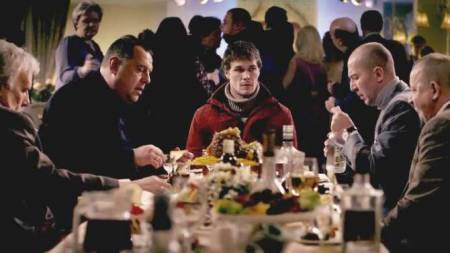
ARTYOM BYSTROV (CENTER) IN THE FOOL
A dark and bitter view of contemporary Russia
The Fool isn't as grand a Russian film as Zvyagintsev's recent Leviathan. But it's more openly bitter and vituperative, full of indignation. With its long night sequence and glitering dark urban landscapes and its moral passion it reminds on of Krzysztof Kieślowski. The plot hinges on the discovery by Dima (Artyom Bystrov)-- a young man, a zealous plumber, engineering student, and future building inspector -- of big ground-to-roof fault lines on two sides of a "dormitory," a project-like building outside a town. It's also leaning over 10%, and he predicts its collapse is imminent. It's occupied by 820 people, and they have to be evacuated immediately. Many of the occupants are poor and out of work, with deadbeats and dissolute youths around the edge. But Dima cares about them just the same, whatever his family or the local city officials think.
When Dima brings his bad news to a big, drunken late-night birthday party for the lady mayor, Nina Galaganova (Natalya Surkova), the various bureaucrats' siphoning-off and general corruption begin to be so enthusiastically exposed, it looks for a while as if Bykov is going to turn the rest of the film into a lecture. But though there is plenty of talk, the delay for it rachets up the tension level, and down to the end the action also remains exciting. And bitterly ironic down to the very dark and visually powerful finale.
Reviewing for Hollywood Reporter, Boyd van Hoeij called The Fool "Extremely bleak and depressing even by Russian standards," but suggested that "the third film of writer director Yury Bykov. . .is also his best" and "will undoubtedly be [his] biggest hit to date." It's a stunning effort, and should put Bykov on the international cinematic map.
Directed, written, edited by Yury Bykov. Camera (color, widescreen), Kirill Klepalov; music, Bykov; production designer, Stanislav Novak; costume designer, Olga Pogodina; sound (Dolby Digital), Arkady Noskov.
The Fool/Durak, 116 mins., debuted at Locarno August 2014, where it won four awards; showing at over a dozen other festivals thereafter. Screened for this review as part of the March 2015 FSLC-MoMA series New Directors/New Films.
US theatrical release begins Wed. Sept. 16, 2015 at Film Forum, NYC.
Last edited by Chris Knipp; 09-16-2015 at 06:00 PM.
-
Shim Sung-bo: HAEMOO
SHIM SUNG-BO: HAEMOO (2014)
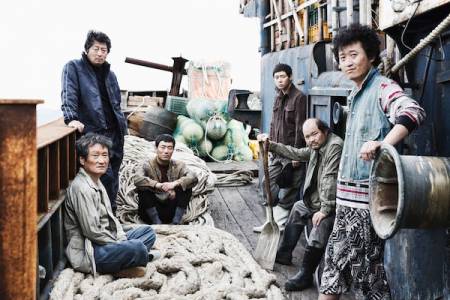
Human trafficking and on board craziness
Things get a bit out of control in more ways than one in the directing debut of Shim Sung-bo, screenwriter of Memories of Murder, debut of his producer here, Bong Joon-ho. The story of a human trafficking disaster that leads to on-board chaos is well-directed as pure action, but it turns into a horror movie, and the multiple characters are hard to tell from each other, except for a romantic couple whose relationship is itself the stuff of purest fantasy.
The story begins calmly and normally enough, which is a plus: the captain of a fishing trawler who's losing money due to the financial downturn and bad luck agrees to carry a load of illegal Korean-Chinese immigrants to South Korean for a substantial fee. Only the boat is a decaying rust bucket, and neither the captain nor any of his crew has any experience of dealing with such a cargo.
Central to the action is the rookie fisherman Dong-sik (Park Yu-chun), who takes an immediate shine to the attractive young Hong-mae (Han Ye-ri) and hides her in the engine room. After a tense coast-guard inspection, things go horribly wrong for the rest of the human cargo, and as the sea fog to which the title refers rolls in, the captain goes bloodily berserk and everything gets really, really crazy and ugly.
Shim Sung-bo’s directorial debut played in competition in San Sebastian’s Official Selection and became the South Korean candidate (but not a finalist) for 2015's Best Foreign Oscar.
The screenplay is reportedly based on real events (and even relates in general terms to last November's Korean Sewol Ferry Incident), but as Shim ramps up the action, verisimilitude falls by the wayside. As a kind of unique cult-horror film with a new and all-too-close-to truth theme, however, it works, and as another example of brilliant over-the-top Korean filmmaking, Haemoo deserves passing attention.
Haemoo ("Sea Fog"), 111 mins., opened 13 August 2014 in Korean, showing at the Toronto Festival Sept. 2014, and nine or ten other festivals. Screened for this review as part of the March 2015 New Directors/New Films series jointly sponsored by the Film Society of Lincoln Center and the Museum of Modern Art.
Last edited by Chris Knipp; 03-03-2015 at 07:54 PM.
-
Stéphane Lafleur: TU DORS NICOLE (2014)
STÉPHANE LAFLEUR: TU DORS NICOLE (2014)
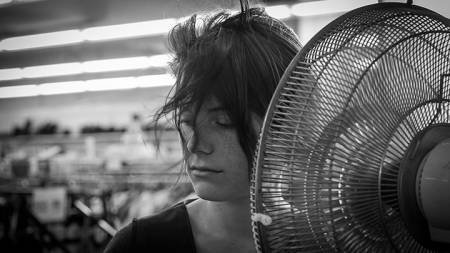
JULIANNE CÔTÉ IN TU DORS NICOLE
Girl drifts through a Quebec summer heatwave
Nicole (Julianne Côté) is spending the summer in the family's ample, ordinary house -- marble floors; walls like Baltimore row house Formstone -- while her parents are away on vacation. She sleeps around a little (no second night), pilfers from the charity clothing store where she works, and hangs out with her best girlfriend Véronique (Catherine St-Laurent), with whom for a while she plans a trip to Iceland.
Québécois director Stéphane Lafleur delivers his third feature in Tu dors Nicole ("You're sleeping, Nicole"), a depiction of a young woman's transitional summer. Aki Kaurismäki, Fernando Eimbcke, and Jim Jarmusch are mentioned as sources, but while the action is dry and aimless, the characters and situation are more nearly mainstream. These are less extreme French Canadians than Xavier Dolan's; they seem mostly just Canadians who speak French. The action consists of short vignettes that are connected by fades to black; the well-crafted visuals are in black and white shot on 35mm film. As Mike D'Angelo, an early advocate in The Dissolve, who compares Tu dors to (the also black and white) Frances Ha, put it, "Tu Dors Nicole doesn’t have anything much on its mind past a series of amusing riffs. That’s fine, though. Pleasure is pleasure."
Be fully prepared for whimsy and pleasure is what you'll have. There is no other agenda to be met, and if you insist upon one you may wind up wondering what the festival raves are about. As in Kaurismäki, there are running gags, notably little Martin (Godefroy Reding), who Nicole used to babysit for, a small blond kid whose voice has dropped -- way down-- prematurely (courtesy of Alexis Lefebvre), and wants her as his girlfriend and is willing to wait; a forever-tricky bike lock; a man who circles around the neighborhood at night trying to lull his baby to sleep, a ploy that works for him (he carries a large take-out coffee) but not the baby.
Early on the equation alters when Nicole's older brother Rémi (Marc-André Grondin) turns up to use the house's living room and basement for his garage band to record an album. Nicole may be interested in his attractive new drummer, JF (Francis La Haye), a possibility threatened because Rémi is always alienating his band members. She is stuck, symbolized, as Alissa Simon points out in Variety, by the way her bike lock is so hard to undo. Things aren't going well. Aside from having been dumped at graduation by her boyfriend for getting very drunk, she gets fired, and Véronique reneges on the Iceland trip, leaving Nicole feeling betrayed. No progress with the drummer. That she's the best pants-cuffer in the country doesn't quite make life matter. Thanks to others' unfair judgments, her life seems paved with missteps. Like many young people, Nicole defines being slightly disgruntled as, for now, the best way to look at life.
The dialogue is well written and each short scene is nicely paced and nicely shot. Montreal musician Remy Nadeau-Aubin and the group Organ Mood make the music pleasant to listen to. Stéphane Lafleur is clearly another young French Canadian filmmaker to watch.
Tu dors Nicole ("You're Sleeping, Nicole"), 93 mins., debuted at Cannes May 2014 and has since been shown at Toronto and nearly two dozen other festivals. Screened for this review as part of the March 2015 FSLC/MoMA New Directors/New Films series. A Kino Lorber release in the US (29 May at Lincoln Center), it opens in Paris 18 March. (AlloCiné press rating was a very good 3.7; Les Inrocks liked it, Cahiers typically not as much.
Last edited by Chris Knipp; 03-27-2015 at 10:35 AM.
-
Kornél Mundruczcó: WHITE GOD (2014)
KORNÉL MUNDRUCZCÓ: WHITE GOD (2014)
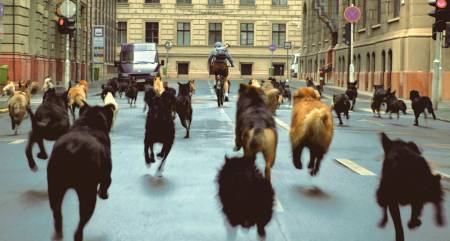
STILL FROM WHITE GOD
Doggy revolt; family trouble
When the strangely ambitious Hungarian film White God begins, the feisty 13-year-old Lili (Zsofia Psotta)) has been left with her father Daniel (Sandor Zsoter). The parents are divorced, and Daniel is irritable with Lili and rejects having Lili's "mutt" Hagen in his apartment; in fact it seems illegal. Hagen, though an amiable canine, causes no end of trouble, and Lili's standing up for him causes her trouble too. She is ousted from the youth orchestra where she plays trumpet when Hagen turns up. Her father drops Hagen on the street, when she will not accept his admittance at the pound. And then begins an adventure that blends Lassie with sci-fi and the politics of revolution. Hagen gets sold into Amores Perros-style bondage and brainwashed into temporarily, but horribly, becoming a vicious pit bull. (The footage in this sequence is grim and bloody enough to offend any animal lovers.) By chance he escapes from this to lead a revolt of dozens of fellow canines through the streets.
Kornél Mundruczcó's epic ambition in this sixth feature leads to a series of grand scenes notable for the remarkable CGI-free use of animal-wrangling. However, if you you are sold b y this, you are more easily won over than I am. All the action seemed to me poorly motivated and often inexplicable and the plot is full of holes. I have to side with Mike D'Angelo again as I did on Tu dors Nicole, this time with a pan. D'Angelo calls this film "stupid," admitting it's "slightly less so" if viewed "allegorically" with the dogs representing minorities. That doesn't compute very well in detail. The idea that the whole city was terrorized by a pack of dogs running through the street isn't made convincing. All we can say is that Mundruczcó makes the most of the running dogs in the street -- except, as D'Angelo points out, it "isn't remotely scary," and the ending resolving the doggy revolt is "laughable." He's also right that the cuts back to Lili and her dad during the climatic chase waste our time, and the film's 119 minutes wind up seeming not remotely justified.
White God has material that might have worked as a short film -- with the dog-run shots used sparingly at the end (not as à la "bad television" as -- D'Angelo again -- "a surreal flash-forward 'grabber' at the outset"). Mundruczcó plays his gimmick for all it's worth and then some. The admiring reviews (there's a current Metacritic rating of 82) suggest this ploy has worked. Time will tell whether this film, with its poorly motivated human behavior, stays on to be a classic like the best animal-human dramas. The wrangling is skillful, and it's well filmed -- though there is too much annoying hand-held shaky-cam imagery throughout. Sequences could be offensive to dog-lovers.
White God, 119 mins., in Hungarian with English subtitles, debuted at Cannes in Un Certain Regard and since showed at over two dozen international festivals including Sundance January 2015. Screened for this review as part of the March 2015 FSLC/MoMA series New Directors/New Films. In the US, a Magnolia Pictures release is scheduled for 27 March 2015 (limited). (Showing at a Landmark Theater in San Francisco starting 3 April 2015).
Last edited by Chris Knipp; 03-28-2015 at 01:08 PM.
-
SHORTS Program 1
SHORTS PROGRAM 1

BLUE AND RED
San Siro
Yuri Ancarani, Italy, 2014, DCP, 24m
This portrait of Milan's famed stadium is both clinical and otherworldly, casting gametime
preparation as the subliminal, collective ritual of our day.
Boulevard’s End
Nora Fingscheidt, Germany, 2014, DCP, 15m
Venice Pier, where L.A. meets the ocean, draws people to play, flirt, and dream. Two
immigrants recount their long journeys to this place shared by so many. North
American Premiere
Blue and Red
Zhou Tao, Thailand, 2014, DCP, 25m
From anti-government protests in Bangkok to rural areas in China, the march of human
life is bathed in vibrant colors as if under a microscope, in what the artist dubs an
“epidermal touch.” World Premiere
Nelsa
Felipe Guerrero, Colombia, 2014, DCP, 13m
An obscure, trance-like tour of a place as menacing as it is incomprehensible. North
American Premiere
The Field of Possible
Matías Meyer, Mexico/Canada, 2014, DCP, 10m
A single shot charts a Montreal residential building over the course of four seasons,
deriving poetry from observation. World Premiere
Last edited by Chris Knipp; 02-28-2015 at 03:14 PM.
-
Naji Abu Nowar: THEEB (2014)
NAJI ABU NOWAR: THEEB (2014)
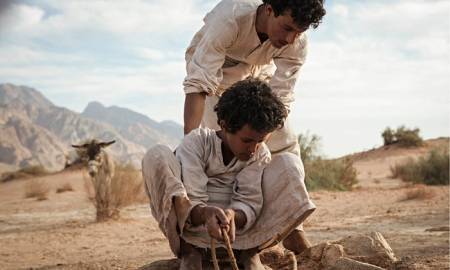
JACIR EID AL-HWIETAT AND HUSSEIN SALAMEH IN THEEB
A desert tale of a boy has a unique flavor and a quiet sweep
This film is a marvel of lean storytelling and authentic atmosphere, cast in a strange bedouin dialect of Arabic and set at the pace of bedouin custom -- bedouin time, bedouin distance, laconic bedouin conversation. Though slow to ignite, it's an intense action tale, the more scary and chilling for happening in a world of sand, vast space and silence.
Theeb is a film from the point of view of a young bedouin boy in 1916; the title is his name and it means "Wolf." He and his older brother have recently been orphaned by the death of their father, a tribal chieftain. Theeb is played by Jacir Eid Al-Hwietat, son of the film's producer, inexperienced in acting, but he delivers a subtle, convincing performance, along with Hussein Salameh Al-Sweilhiyeen as Hussein, his brother. Theeb has been compared to a Western and to David Lean's Lawrence of Arabia and has a few elements of both, but possesses more unique qualities of its own, notably a much more narrow and specific take on WWI and the desert. There is no eccentric English leader grabbing the spotlight here, only a gruff young blond English soldier who asks some bedouin help in finding an oasis, and then gets killed. Oxford-born Joradnian filmmaker Naji Abu Nowar, who has a distinguished father, recruited and trained a cast that was made up exclusively of real bedouin men.
Theeb hovers between boy and man: he cuddles up playfully when his big brother Hussein is showing him how to fire a rifle, which he is nonetheless eager to learn. There will be plenty of rifle fire to come, but not much time for cuddling. That evening Edward (Jack Fox), the English officer, arrives with a guide, Marji (Marji Audeh). The stranger is received with traditional bedouin hospitality. When the Englishman asks Hussein to be his guide, hospitality requires the request be complied with, despite the danger. When Theeb gets a moment with him he asks him in Arabic (which he seems sometimes to understand but sometimes chooses not to) just two questions: "Are you a prince?" and " How many men have you killed?" When they set out for the oasis, Theeb follows without permission.
When they get to the well, there is horror: pulling up the leather bucket, it's red with blood. There is a corpse below polluting the water, a harbinger of evil. Attackers are hiding on the edges of a canyon to ambush the travelers, killing Marji and the soldier. Hussein and Theeb have to abandon their camels and climb to higher ground where they have a vantage point. The unseen enemies terrorize them all night calling out rude taunts in the darkness hour after hour, the voices bouncing around, their direction indeterminate. Yet they are other bedouin, apparently, like Theeb. And like his people they may have been formerly pilgrim guides turned to marauding after gradually being robbed of their function by the railroad that takes the faithful to Mecca more safely and four times as fast as the old desert camel route. (Like Westerns in which railroads also pose dangers, this film is a tense actioner that hints at historical changes happening.) When they're camped for the night, a slow gun battle to the death ensues.
This is World War I, and the British are working toward the defeat of the Ottoman Empire by destroying their railroad, as Lawrence was doing. But Theeb knows nothing of the war, has not much idea what an Englishman is, and becomes locked into is own struggle for survival and honor. The boy wakes the next day up to a world in which he is virtually alone, struggling for survival alongside a dubious character garbed in black, a mercendary (Hassan Mutlag) who lies slumped over his camel near the well with an arrow in his back and is only able to crawl. It's a Beckettian situation of painful survival where two beings in extremis make slow progress feebly helping each other: the wounded mercenary has the camel, Theeb has the mobility.
This is World War I, and the defeat of the Ottoman Empire, through destroying their railroad, as with Lawrence. But Theeb nows nothing of the war, has not much idea what an Englishman is. His struggle is private, in accordance with bedouin values, which are threatened, but timeless.
Reviewing this film in the Orizzonti section at Venice this year, Variety's Jay Weissberg called it "classic adventure film of the best kind, and one that’s rarely seen these days." Young first time filmmaker Naji Abu Nowar, whose accomplishment has given the hitherto negligible Jordanian film industry a shot in the arm, had to fight to get funding, He lived with the bedouin for eight months soaking up atmosphere, also staged acting workshops to develop a qualified cast. Ulrich Seidl's cinematographer Wolfgang Thaler shot the deser, in on Super 16 with an anamorphic lens, so that it seems intimate and breathing with the emotions of the Arab inhabitants. The shooting was done at Wadi Ram, a safe place where the endangered bedouin live in Jordan, standing in for the Hijaz (now Saudi Arabia) as it did in David Lean's epic, and the cast came from this region.
The film has been criticized with some reason for taking too long to get to its main action. But the spare writing feels right nonetheless and the use of setting and authentic leaves a haunting, intimate and intense feeling that would not begin to work if young Jacir Eid Al-Hwietat and his cohorts were not remarkably able to hold our attention. Abu Nowar has worked skillfully with all the human and natural elements of his desert, bedouin palette and it is not surprising he plans a sequel.
Theeb/ذيب (pronounced "Dheeb"), 100 mins., debuted at Venice, winning Best Director in the Orizzonti section Sept. 2014, and played at some other big international festivals in 2014 and 2015 including Toronto, London, Abu Dhabi, Singapore and Miami. Numerous other nominations and awards. It was included in New Directors/New Films at Lincoln Center March 2015 but could not be included in press screenings.It was released theatrically in NYC at Lincoln Plaza Cinema 6 November 2015. In the Bay Area (San Francisco, San Raphael, San Jose) 13 Nov. Metacritic rating 80%. Could not be included in the New Directors 2015 press screenings, so not originally reviewed here. This review was written in November at the time of the theatrical release.
Last edited by Chris Knipp; 12-10-2015 at 12:12 AM.
-
Darhad Erdenibulag & Emyr ap Richard: K (2015)
DARHAD ERDENIBULAG, EMYR AP RICHARD: K (2015)

BAYIN AND JULA IN K
Kafka's "The Castle" literally transposed to Mongolia
"If Jia Zhangke produced it, it has to be good," wrote a writer for the online GBTimes surveying the stingily titled K among Berlin Festival offerings. But this turns not to be somewhat overoptimistic for this purely academic translation of Kafka's unfinished novel The Castle/Das Schloß to a Mongolian setting by Mongolian arts graduate and TV documentary filmmaker Darhad Erenibulag and Inner-Mongolia-based Welsh screenwriter Emyr ap Richard, who collaborated on this pared down version set in a dingy hotel with an indigenous cast.
As longtime film critic Derek Elley comments on Film Business Asia, this largely literal Kafka adaptation winds up feeling "pointless" because the way it is staged is so "dramatically flat": it "lacks any sense of tension," redeemed by only a slight "strain of dry humor." Ap Richard and Erenibulag have done little more than used a minimal location and transposed their pared-down version of the story and characters to an different country and an unusual language. It may appeal to students of the exotic, but it will disappoint because the exoticism is skin deep, with no special penetration into the Kafkaesque experience or perception of its special relevance to this new milieu. Fans of Orson Welles' brilliantly imaginative 1962 screen adaptation of Kafka's The Trial will find it unchallenged.
The cast list gives only one name for the actors. Bayin, whose Seventies-style big hair is an inexplicable indulgence, plays K, the stranger who arrives in a town announcing he has been hired by the Castle as a land surveyor. He is told there's no job for him, and lingers on working as a school janitor and taking the barmaid Frieda (Jula) as his mistress, and so on and on. Among the more flavorful cast members, Zandaraa and Altanochir, as as Jeremias and Artur, K's "assistants," with slick hair and leather jackets, have a louche sleaziness. Nomindalai is striking-looking as Barnabas.
In an effort to build atmosphere, the filmmakers make use of claustrophobic shots of narrow hallways lined by closed-off rooms, lobbies and hazy, smoke-filled bar-lounge in various shades of white, green and blue. Much use is made of tinny old swing band records, cigars, and cigar smoke. The jumble of different period indicators include telegrams, a dark orange rotary telephone, and a large plane soaring overhead. French cinematographer and editor Matthieu Laclau delivers some surprising jolts. Best of these are times when K has been having sex with Frieda and awakes to find his snickering assistants, and others, sitting there in the same room. Laclau achieves nice color and his camerawork shows off the actors and the claustrophobic settings with a neutral attractiveness. There are even a couple of nice dream-like sequences. The filmmakers choose to make the intricate, shabby network of hallways and rooms deliberately confusing, eschewing Kafka's sense of looming, menacing spaces signaled by the novel title The Castle. They never show anything comparable to a castle or even a village: nearly everything is shot indoors.
K, 88 mins., made in China, debuted at Berlin February 2015. Screened for this review as part of the FSLC-MoMA series New Directors/New Films March 2015. A Hong Kong Festival showing is also scheduled. The film is available open-source via Facebook on Vimeo. There seem to have been no major reviews.
Last edited by Chris Knipp; 03-05-2015 at 06:41 PM.
-
Bill & Turner Ross: WESTERN (2015)
BILL & TURNER ROSS: WESTERN (2015)

Life along the border gone tragically wrong
The Ross brothers, Bill and Turner, have focused in their third documentary feature on something very important and terribly sad -- the decline of life along the U.S.-Mexican border. Eagle Pass, Texas is across from Piedras Negras, Coahuila, Mexico, and the two towns' friendly relations and peaceful existences go back many generations. No border necessary, apparently. And during the course of the tragic and elegiac film, we see this go gradually and undeniably wrong, the narco-trafficking violence of Mexico finally penetrating Piedras Negras, and a directive from Washington to temporarily cut off cattle trading across the border disrupting livelihoods, the whole shared way of life apparently disappearing, criminals and haters winning out over peaceful life and honest work.
The Ross brothers' film has a classic look and a natural, organic flow. It begins with patriotic celebrations between the two towns and social gatherings to move on to more intimate looks at its two key personalities, 3rd-term mayor and fluent Spanish-speaker Chad Foster of Eagle Pass, and cattle rancher Martín Wall, who knows some Spanish himself, though he's more fluent in F-words, especially when the USDA cuts off his lifeline over imagined danger to cattle inspectors that he and his cohorts consider just a product of DC politics. As is the multi-billion-dollar border fence that is under constant construction. Such things were never needed between Piedras Negras and Eagle Pass. Time and again the film, which focuses on community through individuals, shows dances, celebrations, even a bullfight, that illustrate how intermingled the two cultures are here.
Silver-haired, mustachioed, and elegant, Chad Foster has constant friendly interchange, always in Spanish, with Piedras Negras mayor Jose Manuel Maldonado and other Mexican colleagues. But in a key scene Foster reads in his office from a rabid Meican-haters website that has attacked him as a traitor. The wall, the shutdowns, and the strengthening of borders and deportations are the darlings of a rabid rightwing element that will do whatever it can to end the kind of peace that exists between these two cities, this film hints.
There is no doubt about the drug cartel violence in Mexico, with its bribing or threatening police and murdering and disfiguring citizens and marking their bodies with admonitory signs. Both Foster and Wall pooh-pooh worries about such things in their region. But then stories of violence in Piedras Negras come, and Foster himself has been caught in the crossfire in a Piedras Negras restaurant -- though he has survived. After a violent wave of rainstorms causing wide damage, Maldonado is then killed in a plane crash that some hint might be a narco killing. Again Wall scoffs, but the fear is there. And finally, Foster retires.
Just as it shows the barrel-chested, usually gruff and foul-mouthed Wall playing joyfully with his feisty little daughter Brylyn, the film also repeatedly returns to show the usually immaculate Mayor Foster in beat-up, torn cowboy hat driving his little pickup along the river border, looking out over open country in all directions. The implication is that the border is still safe, despite the rumors, news stories, USDA, and rightwing determination to ramp up security and cut off interchange. But there are many signs that the drug violence has infected everything, and is growing.
On the surface the Rosses' film seems a conventional documentary. But it has an intimacy and a passion to it that set it apart and make it matter. It's a fine piece of work about important issues.
Western, 93 mins., debuted at Sundance January 2015 in competition. It was reviewed at IFC Center, NYC by Scott Foundas in Variety; Foundas sets this film in the context of the Rosses' two other ones. Screened for this review March 2015 as part of New Directors/New Films (Lincoln Center, MoMA).
US theatrical release began Fri., 25 Sept. 2015.
Last edited by Chris Knipp; 02-01-2020 at 06:50 PM.
 Posting Permissions
Posting Permissions
- You may not post new threads
- You may not post replies
- You may not post attachments
- You may not edit your posts
-
Forum Rules
Selects






 Reply With Quote
Reply With Quote























Bookmarks